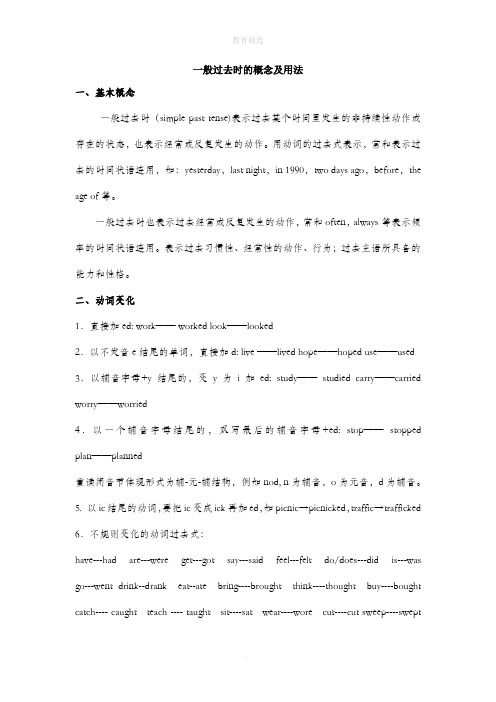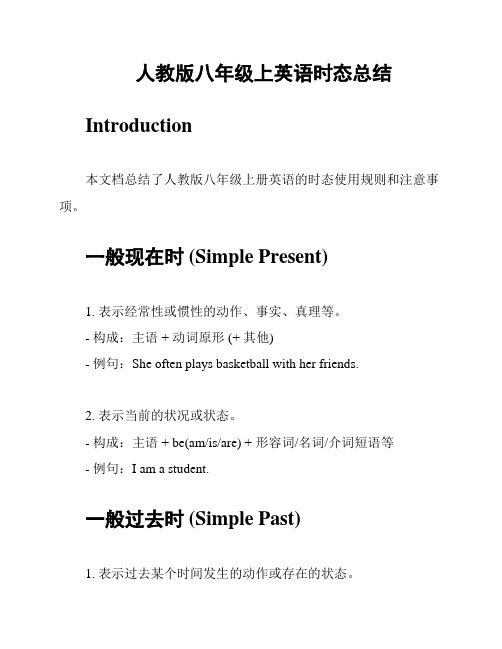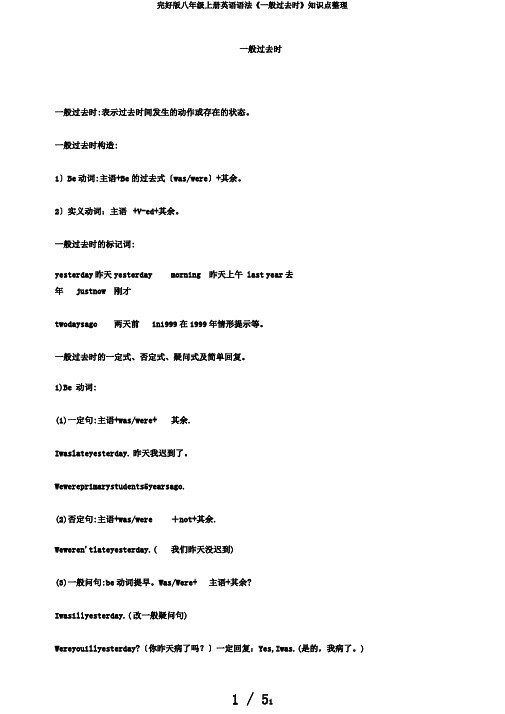八年级英语一般过去时
人教版英语八年级上册_Unit 1 复合不定代词和一般过去时

Don't waste food. We don't have much now.别浪费食物。我们现在没有很多(食物)了。
一般过去时的规则动词与不规则动词
1.一般过去时的定义
一般过去时表示过去某个时间发生的动作或存在的状态,也表示过去经常或反复发生的动作。
④中间去e,末尾加t。如:keep→kept;feel→felt;sleep→slept;sweep→swept等。
⑤过去式以ought或aught结尾的单词。如:think→thought; buy→bought; bring→brought; teach→taught;catch→caught等。
-I went to Beijing.我去北京了。
(3)两个或两个以上动词用and连接时,若前一个动词为过去式,后面的动词一般也要用其过去式。
I stayed at home and read a goodbook last Sunday.上个星期天我待家里读了一本好书。
4.规则动词过去式的构成和发音
③复合不定代词被形容词、动词不定式等修饰时,形容词、动词不定式等必须后置,结构为"复合不定代词+形容词/动词不定式”。
I'm hungry. Do you have anything to eat?我饿了。你有什么吃的东西吗?
I really havesomething to do.我确实有事情要做。
班级姓名学号分数
Unit1 Where didyougo on vacation?
复合不定代词和一般过去时
(时间:60分钟,满分:100分)
八年级英语时态总结

八年级英语时态总结八年级英语时态总结英语时态是英语语法的重要部分,掌握好时态的用法对于准确表达意思非常重要。
下面是八年级英语时态总结,希望能够帮助大家更好地掌握英语时态的用法。
一、一般现在时一般现在时表示经常性或习惯性的动作、状态或真理。
例如:I go to school every day.(我每天去上学。
)二、一般过去时一般过去时表示过去某个时间发生的动作或存在的状态。
例如:I played basketball yesterday.(我昨天打篮球。
)三、一般将来时一般将来时表示将来某个时间要发生的动作或存在的状态。
例如:I will visit my grandparents tomorrow.(明天我将去看望我的祖父母。
)四、现在进行时现在进行时表示现在正在进行的动作。
例如:She is reading a book now.(她现在正在读书。
)五、过去进行时过去进行时表示过去某一时间正在进行的动作。
例如:They were playing soccer at 3 o'clock yesterday afternoon.(昨天下午3点他们正在踢足球。
)六、将来进行时将来进行时表示将来某一时间正在进行的动作。
例如:I will be studying at this time tomorrow.(明天这个时候我将正在学习。
)七、现在完成时现在完成时表示过去某个时间开始,一直持续到现在的动作或状态。
例如:I have lived in this city for 5 years.(我在这个城市已经住了5年。
)八、过去完成时过去完成时表示过去某个时间之前已经发生的动作或状态。
例如:He had finished his homework before he went to bed.(他睡觉前已经完成了他的家庭作业。
)九、将来完成时将来完成时表示将来某个时间之前已经完成的动作或状态。
例如:I will have graduated from university by the end of next year.(到明年年底我将已经大学毕业。
北师大版英语八年级上册Unit1 一般过去时的概念及用法

一般过去时的概念及用法一、基本概念一般过去时(simple past tense)表示过去某个时间里发生的非持续性动作或存在的状态,也表示经常或反复发生的动作。
用动词的过去式表示,常和表示过去的时间状语连用,如:yesterday,last night,in 1990,two days ago,before,the age of等。
一般过去时也表示过去经常或反复发生的动作,常和often,always等表示频率的时间状语连用。
表示过去习惯性、经常性的动作、行为;过去主语所具备的能力和性格。
二、动词变化1.直接加ed: work—— worked look——looked2.以不发音e结尾的单词,直接加d: live ——lived hope——hoped use——used 3.以辅音字母+y结尾的,变y为i加ed: study——studied carry——carried worry——worried4.以一个辅音字母结尾的,双写最后的辅音字母+ed: stop——stopped plan——planned重读闭音节体现形式为辅-元-辅结构,例如nod, n为辅音,o为元音,d为辅音。
5. 以ic结尾的动词,要把ic变成ick再加ed,如picnic→picnicked,traffic→trafficked 6.不规则变化的动词过去式:have---had are---were get---got say---said feel---felt do/does---did is---was go---went drink--drank eat--ate bring----brought think----thought buy----bought catch---- caught teach ---- taught sit----sat wear----wore cut----cut sweep----sweptsleep——slept see----saw become----became read——read7.以辅元辅结尾的加d三、用法(1)一般过去时表示在过去某个特定时间发生,也可以表示过去习惯性、经常性的动作。
八年级下册时态知识点

八年级下册时态知识点时态是英语语法中非常重要的部分,正确使用时态和合适运用时态可以确保我们的英语表达准确、流利、自然。
本文将对八年级下册学生需要掌握的时态知识点做出一些简单的解释和应用,以帮助学生更好地理解和运用时态。
一、一般现在时 (Present Simple Tense)一般现在时用于表示经常性或习惯性的动作或状态。
例如:“I go to school every day.”(我每天去上学。
)、“She plays basketball every Saturday.”(她每个星期六打篮球。
)、“The sun rises in the east.”(太阳从东方升起。
)等等。
此外,一般现在时还可用于表示真理、规律和普遍性的事实。
例如:“Water freezes at zero degrees centigrade.”(水在零摄氏度时结冰。
)、“The earth revolves around the sun.”(地球绕太阳旋转。
)、“A bird can fly.”(鸟能飞。
)等等。
二、一般过去时 (Past Simple Tense)一般过去时用于表示已经完成的过去的动作或状态。
例如:“I visited my grandparents last weekend.”(我上周末去看了我的祖父母。
)、“She studied psychology in university.”(她在大学学了心理学。
)、“He worked as a waiter in a restaurant before.”(他以前在一个餐馆当过服务员。
)等等。
另外,一般过去时也可以用于表示过去习惯性或重复性的动作,但这种用法通常会和表示具体时间的副词或短语搭配使用。
例如:“I used to eat a lot of junk food when I was a kid.”(我小时候经常吃垃圾食品。
)、“He would always listen to music on his way to work.”(他上班的路上总是听音乐。
人教版八年级上英语时态总结

人教版八年级上英语时态总结Introduction本文档总结了人教版八年级上册英语的时态使用规则和注意事项。
一般现在时 (Simple Present)1. 表示经常性或惯性的动作、事实、真理等。
- 构成:主语 + 动词原形 (+ 其他)- 例句:She often plays basketball with her friends.2. 表示当前的状况或状态。
- 构成:主语 + be(am/is/are) + 形容词/名词/介词短语等- 例句:I am a student.一般过去时 (Simple Past)1. 表示过去某个时间发生的动作或存在的状态。
- 构成:主语 + 动词过去式 (+ 其他)- 例句:He studied English last night.一般将来时 (Simple Future)1. 表示将来某个时间或将来经常性发生的动作。
- 构成:主语 + will + 动词原形 (+ 其他)- 例句:They will visit their grandparents next week. 现在进行时 (Present Continuous)1. 表示当前正在进行的动作。
- 构成:主语 + be(am/is/are) + 现在分词(+ 其他) - 例句:She is watching TV right now.过去进行时 (Past Continuous)1. 表示过去某个时间正在进行的动作。
- 构成:主语 + was/were + 现在分词(+ 其他)- 例句:They were playing soccer at that time.高级时态1. 现在完成时 (Present Perfect)- 表示过去的某个时间到现在的动作或状态。
- 构成:主语 + have/has + 过去分词(+ 其他)- 例句:I have finished my homework.2. 过去完成时 (Past Perfect)- 表示过去的某个时间之前的动作或状态。
完整版八年级上册英语语法《一般过去时》知识点整理

一般过去时一般过去时:表示过去时间发生的动作或存在的状态。
一般过去时构造:1〕Be动词:主语+Be的过去式〔was/were〕+其余。
2〕实义动词:主语+V-ed+其余。
一般过去时的标记词:yesterday 昨天yesterday morning 昨天上午 last year 去年justnow 刚才twodaysago 两天前in1999在1999年情形提示等。
一般过去时的一定式、否定式、疑问式及简单回复。
1)Be 动词:(1)一定句:主语+was/were+ 其余.Iwaslateyesterday. 昨天我迟到了。
Wewereprimarystudents5yearsago.(2)否定句:主语+was/were +not+其余.Weweren'tlateyesterday.( 我们昨天没迟到)(3)一般问句:be动词提早。
Was/Were+ 主语+其余?Iwasillyesterday.( 改一般疑问句)Wereyouillyesterday?〔你昨天病了吗?〕一定回复:Yes,Iwas.(是的,我病了。
)否定回复:No,Iwasn't.( 不,我没病。
)(4)特别问句:对谓语动词进行发问的:疑问词+was/were+主语+其余(一般疑问句)?Iwasbornin1997.→Whenwereyouborn?你是什么时候出生的?实义动词:一定句:主语+V-ed+其余。
Icalledupmygoodfriendjustnow.否定句:主语+didn’t+V原形+其余Ididn’targuewithTomlastweek.(3)一般问疑句:+其余?Did+主语+V原形)Iboughtasouvenirin2021.(改一般疑问句Didyoubuyasouvenirin2021?一定回复:Yes,Idid.否定回复:No,Ididn ’t.(4)特别疑问句:疑问词+did+主语+V原形 +其余?IwenttoHongKonglastyear.WheredidyougotoHongKonglastyear?变化规那么1〕、规那么动词的变化规那么:1〕一般状况下在词尾直接加ed。
八年级英语一般过去时和现在完成时的区别教案外研版
一般过去时和现在完成时的区别前者表示过去已经做了的事,后者表示过去某一时刻正在做的事一般过去时往往是表示过去的几个时间点;过去进行时表示的是过去的一个时间点。
比较过去时与现在完成时1)过去时表示过去某时发生的动作或单纯叙述过去的事情,强调动作;现在完成时为过去发生的,强调过去的事情对现在的影响,强调的是影响。
2)过去时常与具体的时间状语连用,而现在完成时通常与模糊的时间状语连用,或无时间状语。
一般过去时的时间状语:y e s t e r da y , l a s t we e k,… a g o,in19 80 , i n Oc t ober , j us t now, 具体的时间状语共同的时间状语:t hi smorni ng , t onig ht, t hi sApr i l , now, once ,be f or e , a l r e a dy, r e c e ntl y , l a t e l y现在完成时的时间状语for, since, so far, ever, never, just, yet, till/ until, up tonow, in past years, always,不确定的时间状语3)现在完成时可表示持续到现在的动作或状态,动词一般是延续性的,如live,teach,learn, work, study, know.过去时常用的非持续性动词有come, go, leave, start, die, finish, become, get married等。
举例:I s a w thi s f i l m y e s t e r da y.(强调看的动作发生过了。
)Iha ves e e n t hi s f i lm.(强调对现在的影响,电影的内容已经知道了。
)Why didyouget up so early?(强调起床的动作已发生过了。
)Whoha sn' t ha nded i n hi spa per ?(强调有卷子,可能为不公平竞争。
八年级英语时态总结
八年级英语时态总结八年级英语时态总结前言在学习英语过程中,掌握时态是非常重要的。
时态不仅关系到句子的时刻,还与动作的发生顺序和完成状态有关。
八年级英语时态共有多种形式,本文将对其进行总结和归纳,帮助大家更好地掌握和运用。
正文一、一般现在时(Simple Present Tense)1.表示习惯性动作、经常性发生的事情。
2.表示客观事实、普遍真理或正式规定的事情。
二、一般过去时(Simple Past Tense)1.表示过去某个时间发生的动作。
2.表示过去某段时间内的经历或状态。
三、一般将来时(Simple Future Tense)1.表示将来要发生的动作或事件。
2.表示将来的计划、安排或打算。
四、现在进行时(Present Continuous Tense)1.表示现阶段正在进行的动作。
2.表示现阶段暂时性发生的动作。
五、过去进行时(Past Continuous Tense)1.表示过去某一时间段内正在进行的动作。
2.表示过去某一时间段内被打断的动作。
六、将来进行时(Future Continuous Tense)1.表示将来某一时间段内正在进行的动作。
2.表示将来某一时间段内预计会发生的动作。
七、现在完成时(Present Perfect Tense)1.表示过去发生的动作对现在造成的影响或结果。
2.表示过去某个时间之前已经完成的动作。
八、过去完成时(Past Perfect Tense)1.表示过去某个时间之前已经完成的动作或状态。
2.表示过去某个时间之前的先后关系。
九、将来完成时(Future Perfect Tense)1.表示将来某个时间之前将会完成的动作或状态。
2.表示将来某个时间之前的先后关系。
十、现在完成进行时(Present Perfect Continuous Tense)1.表示过去某个时间开始进行的动作一直持续到现在。
2.表示过去某个时间开始进行的动作,对现在造成的结果仍然存在。
八下英语满分必刷题Unit3 Online tours 现在完成时和一般过去时辨析(重点语法提升练)
2022-2023学年八年级英语下册单元模块满分必刷题(牛津译林版)Unit 3 Online tours【刷语法】(重点语法提升练)现在完成时和一般过去时辨析现在完成时与一般过去时的区别:现在完成时侧重对现在的影响;一般过去时只是对过去的描述,不强调影响,是过去的时间点发生的事情。
When提问时间点,不能跟现在完成时连用。
如:I have had breakfast. 我已经吃了早餐了。
(已经饱了,不用再吃了)I had breakfast. 我吃过早餐了。
(普通描述过去的事情,没有饱不饱的含义)Derek has watched the movie. When did he watch it? 德里克已经看过这电影了。
他什么时候看的?一、单项选择1.—Excuse me, may I speak to Michelle, please?—Sorry. She ________ the library. Shall I take a message?A.went to B.has been to C.has gone to D.was2.Premier Zhou Enlai ________ for many years, but he still lives in the hearts of Chinese people. A.died B.has died C.was dying D.has been dead 3.—When did your teacher start to write his new novel?—Three months ago. So far, he ________ more than half of it.A.finishes B.finished C.will finish D.has finished4.— ________ did your aunt leave her hometown?—Many years ago. In fact, she ________ for nearly ten years.A.When; has left B.When; has been awayC.How long; has left D.How long; has been away5.It ________ four years since my family ________ to Wuxi.A.is, has moved B.has been, has moved C.is, moved D.was, moved 6.Daniel ________ Lucy in 2010. That is to say, they ________ for 11 years.A.got married with; have got married B.got married to; have marriedC.married; have been married D.married to; have been married7.Mr White ________ his keys in the office this evening, so now he has to call his wife for help. A.has forgotten B.forgot C.has left D.left8.—Why are you still here? It’s almost eight o’clock.—Because I ________ my work. Don’t worry. There’s only a little left.A.won’t finish B.didn’t finish C.haven’t finished D.is finishing 9.Yesterday Andy ________ his dictionary to me, and said I could ________ it for a week. A.lent; borrow B.borrowed; have C.gave; keep D.lent; keep 10.They got married ________ 1960. That means they have been married ________ 1960. A.in; for B.since; for C.in; since D.since; since 11.—I bought the geese two weeks ago.—Oh, you mean you ________ them ________ half a month ago.A.have kept;since B.have bought;forC.have had;since D.have had;for12.Millie ________ the book for three weeks. She’ll return it to the library tomorrow.A.lent B.borrowed C.has kept D.has borrowed 13.Mary used to be a guide, but she ________ her job and work as a shopkeeper now. A.changed B.will change C.has changed D.is changing 14.It ________ over 100 years since the Communist Party ________.A.was; was set up B.has been; was set up C.has been; set up D.was; set up 15.—When did the couple __________?—They __________ for 20 years.A.marry; got married B.get married; have got married C.marry; have got married D.get married; have been married 16.Pizhou used to be a small city but great changes __________ in it in the past ten years. A.have been taken place B.took placeC.have taken place D.were taken place17.—________ your grandfather die?—He ________ for nearly ten years.A.When did; has died B.When did; has been deadC.How long has; has dead D.How long did; has been died18.Hurry up! The concert ________. It ________ for ten minutes.A.has begun; has begun B.has been on; beganC.has begun; has been on D.began; has been on19.—When did your father ________ your mother?— They ________ for 20 years.A.marry; got married B.get married with; have been married:C.marry; have been married D.get married to; have got married20.—I haven’t seen Eric for several days. He isn’t at home, is he?—No. He ________ Shanghai last week. He ________ Shanghai for the whole week and he will spend two more days there.A.has come to; has been to B.has gone to; has been inC.went to; has gone to D.went to; has been in21.My friend Lucy is helpful and she ________ me a lot in the past three years.A.helps B.will help C.has helped D.is helping22.—Mary, do you know the couple over there?—Yes, they are my parents’ friends. They ________ for three years.A.married B.was married C.have married D.have been married 23.—Has your cousin ________ the Great Wall?—Sure. He ________ there with me last summer.A.been to; has gone B.gone to; went C.gone to; has gone D.been to; went 24.—Yancheng is developing so fast.—Quite right! It ________ a lot over the years.A.changes B.changed C.was changing D.has changed25.— Jim, turn down the music. The baby is sleeping.— Don’t worry. He ________ for half an hour.A.woke up B.has woken up C.was awake D.has been awake26.—It will be Tina’s turn to perform at the show soon, but I can’t find her. Do you know ________?—I met her in the washroom just now.A.where she went B.where did she go C.where she has gone D.where has she gone 27.—Yunnan is very beautiful. I ________ there last year.—Yes, I ____ there twice.A.went; has gone B.went; have been C.have gone; went D.have been; went 28.Ten years ________ since they ________ Shanghai.A.have passed; arrived at B.has passed; got toC.passed; reached D.has passed; reached to29.—You don’t look well. You’d better see the doctor.—I ________. But the doctor said there was nothing serious.A.have B.am C.will D.was30.The house is dirty. We ________ it for weeks.A.didn’t clean B.hadn’t cleaned C.don’t clean D.haven’t cleaned 31.—Where is your brother?—He __________ to the park.A.has been B.has gone C.is going D.went32.— Do you know the storybook?— Of course. I ________ it several times.A.read B.is reading C.have read D.had read 33.—The poster says Iron Man 3 will be on this evening. Let’s go and see it.—But I ________ it.A.see B.saw C.have seen D.will see 34.—Why are you still here? It’s so late.—Because I ________ my work.A.didn’t finish B.wouldn’t finish C.haven’t finished D.won’t finish 35.— _______ you _______ your silk scarf yet?— No. I think I have to buy a new one today.A.Did; find B.Have; found C.Are; finding D.Had; found 36.We ________ four quizzes and five tests so far this semester.A.are having B.have C.have had D.had37.—Let’s go for a walk.—But I ________ my homework yet.A.don’t finish B.won’t finish C.didn’t finish D.haven’t finished 38.—Look! Someone ________ the classroom.—Yes, but I arrived here just now.A.cleaned B.was cleaning C.is cleaning D.has cleaned39.— Do you want to buy this book?—No, I ________ reading it already.A.finish B.have finished C.will finish D.am going to finish 40.—Will you go and see the movie with me?—Thank you. But I ________ it already.A.have seen B.have saw C.saw D.will see二、用所给单词的正确形式填空41.________ you ________ (hear) from your parents recently? I miss them very much as well. 42.—Mary with her parents ________ (go) to Hong Kong already.—Really? When will they be back?43.—________ you ________ (clean) the room?—Yes, we ________ (do) that already.—When ________ you ________ (do) it?—We ________ (do) it an hour ago.44.—Why are you still waiting here?—Doctor Y u promised to attend the party, but he ______(not appear).45.— Oh, my god! Our classroom is in a mess. Who ________ (not tidy) it?— It’s me.46.Oh, my god! Little John seems to be sad. I guess something ________ (happen) to him.47.—Hi, Judy. Has Jack come back from Hubei province?—Yes. He __________ (stay) in a flat in the center of Wuhan for two months.48.Yang Hui ________ (study) in Britain for several years. But now he works as a teacher in a mountain49.—Look at the sign! It says “No Smoking”!—Sorry, I ________ (not notice) it!50.—I hear you are going to sell your house. Is it true?—Yes, I have already sold it. I ________ (have) it for more than twelve years. It was too old.参考答案:1.C【详解】句意:——打扰了,我可以和米歇尔说话吗?——抱歉。
初中英语人教版八年级下册五种英语时态
,
初中英语人教版八年级下册五种英语时态
目录
01
添加目录标题
02
一般现在时
03
一般过去时
04
一般将来时
05
现在进行时
06
过去进行时
01
添加章节标题
02
一般现在时
定义
用于描述事实、观点或习惯性行为
用于表示计划、安排或习惯性动作
一般现在时表示现在经常发生的动作或存在的状态
通常与时间状语连用如lwys、usully、sometimes等
常用时间状语:now, t the moment, right now等
示例句子:I m plying bsketbll now. (我正在打篮球。)
用法:表示正在进行的动作或状态
06
过去进行时
定义
添加标题
添加标题
添加标题
添加标题
过去进行时由"ws/were + -ing"构成
过去进行时表示在过去某一时刻正在进行的动作或状态
现在进行时与一般现在时的区别和用法
用法
表示正在进行的动作或存在的状态
表示动作的持续进行
表示即将发生的动作
表示暂时性的行为或想法
结构
定义:表示正在进行的动作或状态
结构:be动词+动词ing
时间状语:now, t the moment, these dys等
用法:描述当前发生的动作或状态
示例
句子结构:主语+be动词+动词ing
通常与时间状语连用如yesterdy、lst night、in 1990等
结构为“主语+动词过去式+其他”
- 1、下载文档前请自行甄别文档内容的完整性,平台不提供额外的编辑、内容补充、找答案等附加服务。
- 2、"仅部分预览"的文档,不可在线预览部分如存在完整性等问题,可反馈申请退款(可完整预览的文档不适用该条件!)。
- 3、如文档侵犯您的权益,请联系客服反馈,我们会尽快为您处理(人工客服工作时间:9:00-18:30)。
Regular (规则)and irregular(不规则) verbs
一般过去时
Simple Past Tense
什么叫做一般过去时?
概念:表示过去 某一时候 或 某一段时 间 所发生了的事情或存在的状态。 其构成:由动词的过去式构成 be 动词的过去式 am,is→was,其否定式 wasn't are→were,其否定式 weren't 一般疑问句:was 和were 提到句首
表示过去经常发生的动作, 也可用 used to +动词原形, 或would + 动词原形
• For example, • I used to be a teacher. • She would talk to herself for hours.
• 否定形式:didn't+动词原形。 • 疑问形式:did +主语 +动词原 形?
3,常用的一般过去时的 时间状语
• yesterday,the day before yesterday, last year/month/spring/week/Monday/night/ • yesterdaymorning/afternoon/evening • at that time/just now=a moment ago • 2 days ago/3 years ago/5months ago/a week ago/ • in 1990/2010/ • in the old days/ in those days
He ________(watch) TV and ________ __(read) an interesting book.
改写句子 • 1、Lucy did her homework at home. (改否定句) • Lucy ________ _______ her homework at home. 2、There was some orange in the cup. (变一般疑问句) ______ there _______ orange in the cup?
For example(例句) • ''Please look at the sign:NO PHOTOS!'' • ''Sorry I ____it'' • A.don't see B. see C.saw D.didn't see 答案:D
用正确形式填空
1. I _________ (have) an exciting party l ast weekend. 2. What ________ Tom ________ (do) on Saturday evening?
carry 以’辅音字母 +y'‘结尾的动词, cry 变y为i 加+ed 以重读闭音节结尾,stop 末尾只有一个辅音 plan 字母,先双写该字 母,再加+ed
irregular verbs(不规则动词)
• 这些词都是没有规则的,所以只需 要背 • textbook ,page 142 • ask some students to read it.
2.Regular verbs(规则动词)的过去式的变 化规则 和读音
构成方法 一般情况.在,动词 原形后加+ed 以字母e结尾的动 词,只加+d 原形 want answer move die 过去式 wanted answered moved died carried cried stopped planned
